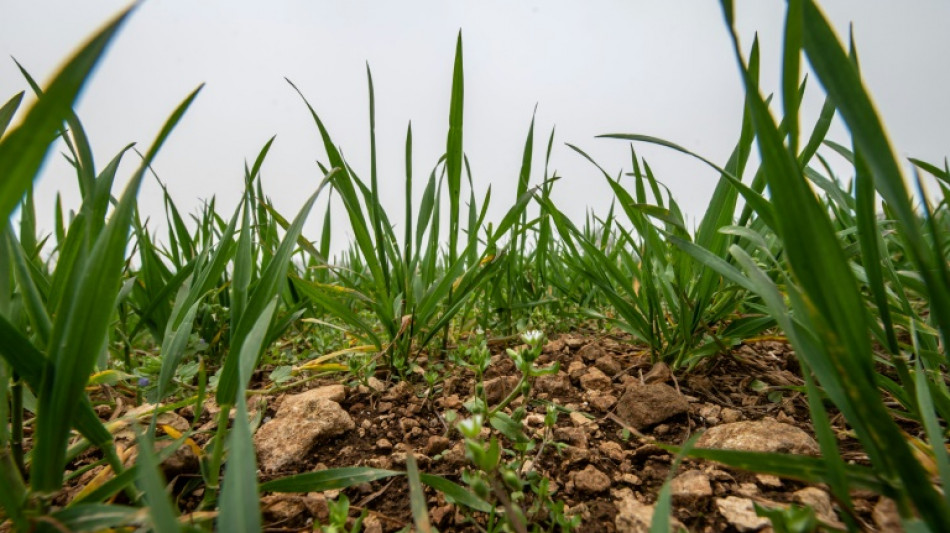
-
 Maresca leaves celebrations to players after Chelsea sink Fulham
Maresca leaves celebrations to players after Chelsea sink Fulham
-
Trump eyes gutting US diplomacy in Africa, cutting soft power: draft plan

-
 Turkey bans elective C-sections at private medical centres
Turkey bans elective C-sections at private medical centres
-
Lebanon army says 3 troops killed in munitions blast in south

-
 N.America moviegoers embrace 'Sinners' on Easter weekend
N.America moviegoers embrace 'Sinners' on Easter weekend
-
Man Utd 'lack a lot' admits Amorim after Wolves loss

-
 Arteta hopes Arsenal star Saka will be fit to face PSG
Arteta hopes Arsenal star Saka will be fit to face PSG
-
Ukrainian troops celebrate Easter as blasts punctuate Putin's truce

-
 Rune defeats Alcaraz to win Barcelona Open
Rune defeats Alcaraz to win Barcelona Open
-
Outsider Skjelmose in Amstel Gold heist ahead of Pogacar and Evenepoel

-
 Arsenal make Liverpool wait for title party, Chelsea beat Fulham
Arsenal make Liverpool wait for title party, Chelsea beat Fulham
-
Trump slams 'weak' judges as deportation row intensifies

-
 Arsenal stroll makes Liverpool wait for title as Ipswich face relegation
Arsenal stroll makes Liverpool wait for title as Ipswich face relegation
-
Sabalenka to face Ostapenko in Stuttgart final

-
 Kohli, Padikkal guide Bengaluru to revenge win over Punjab
Kohli, Padikkal guide Bengaluru to revenge win over Punjab
-
US aid cuts strain response to health crises worldwide: WHO

-
 Birthday boy Zverev roars back to form with Munich win
Birthday boy Zverev roars back to form with Munich win
-
Ostapenko eases past Alexandrova into Stuttgart final

-
 Zimbabwe on top in first Test after Bangladesh out for 191
Zimbabwe on top in first Test after Bangladesh out for 191
-
De Bruyne 'surprised' over Man City exit

-
 Frail Pope Francis takes to popemobile to greet Easter crowd
Frail Pope Francis takes to popemobile to greet Easter crowd
-
Lewandowski injury confirmed in blow to Barca quadruple bid

-
 Russia and Ukraine accuse each other of breaching Easter truce
Russia and Ukraine accuse each other of breaching Easter truce
-
Zimbabwe bowl Bangladesh out for 191 in first Test in Sylhet

-
 Ukrainians voice scepticism on Easter truce
Ukrainians voice scepticism on Easter truce
-
Pope wishes 'Happy Easter' to faithful in appearance at St Peter's Square

-
 Sri Lanka police probe photo of Buddha tooth relic
Sri Lanka police probe photo of Buddha tooth relic
-
Home hero Wu wows Shanghai crowds by charging to China Open win

-
 Less Soviet, more inspiring: Kyrgyzstan seeks new anthem
Less Soviet, more inspiring: Kyrgyzstan seeks new anthem
-
Defending champion Kyren Wilson crashes out in first round of World Snooker Championship

-
 NASA's oldest active astronaut returns to Earth on 70th birthday
NASA's oldest active astronaut returns to Earth on 70th birthday
-
Exec linked to Bangkok building collapse arrested

-
 Zelensky says Russian attacks ongoing despite Putin's Easter truce
Zelensky says Russian attacks ongoing despite Putin's Easter truce
-
Vaibhav Suryavanshi: the 14-year-old whose IPL dream came true

-
 Six drowning deaths as huge waves hit Australian coast
Six drowning deaths as huge waves hit Australian coast
-
Ukrainian soldiers' lovers kept waiting as war drags on

-
 T'Wolves dominate Lakers, Nuggets edge Clippers as NBA playoffs start
T'Wolves dominate Lakers, Nuggets edge Clippers as NBA playoffs start
-
Taxes on super rich and tech giants stall under Trump

-
 Star Wars series 'Andor' back for final season
Star Wars series 'Andor' back for final season
-
Neighbours improvise first aid for wounded in besieged Sudan city

-
 Tariffs could lift Boeing and Airbus plane prices even higher
Tariffs could lift Boeing and Airbus plane prices even higher
-
Analysts warn US could be handing chip market to China

-
 Unbeaten Miami edge Columbus in front of big MLS crowd in Cleveland
Unbeaten Miami edge Columbus in front of big MLS crowd in Cleveland
-
Social media helps fuel growing 'sex tourism' in Japan

-
 'Pandora's box': alarm bells in Indonesia over rising military role
'Pandora's box': alarm bells in Indonesia over rising military role
-
Alaalatoa hails 'hustling hard' Brumbies for rare Super Rugby clean sheet

-
 Trio share lead at tight LA Championship
Trio share lead at tight LA Championship
-
Sampdoria fighting relegation disaster as old heroes ride into town

-
 Recovering pope expected to delight crowds at Easter Sunday mass
Recovering pope expected to delight crowds at Easter Sunday mass
-
Nuggets edge Clippers in NBA playoff overtime thriller, Knicks and Pacers win


The scientists helping farmers kick the chemical habit
In a field in western France, the small purple and white flowers quivering among tender shoots of wheat are a clue that this is not conventional single-crop farmland.
In fact, this whole area is part of scientific work to help farmers cut down on their use of pesticides, herbicides and chemical fertilisers.
"I felt that these products were dangerous," said farmer David Bonneau as he hunched over the little wildflowers -- veronica and hickweed. And "the general public is asking for reductions".
One of his experimental plots is treated the standard way, with chemical weedkiller; another he weeds mechanically with a harrow whose teeth tear up the wild plants; while a third will not be treated at all.
He is part of a project involving 400 farms and around 40 villages in the Deux-Sevres region of western France, where scientists are experimenting with different techniques to cut pollution.
Researchers from the French research agency, CNRS, support volunteer farmers to reduce the use of pesticides -- probable sources of cancer and fatal to birds -- as well as water-polluting chemical fertilisers, the prices of which are exploding.
While Russia's invasion of Ukraine has raised the spectre of food shortages, policymakers in Europe should not waver in their commitment to green agriculture, experts say.
And protecting Nature, a central task of biodiversity negotiations currently taking place in Geneva, is also a matter of safeguarding the water we drink, the food we eat and the air we breathe.
"It's important from a political point of view to show long-term engagement," said Robert Finger, head of farming systems research at ETH University of Zurich.
And greener could even mean more profitable.
"In many parts of the world, we are at a point where fertiliser use is very inefficient in terms of additional yield," he said, referring to Europe and parts of Asia.
Excessive use of fertilisers or pesticides can affect small and large crops.
- Dangerous habits -
Meanwhile, Pepijn Schreinemachers, a researcher at the World Vegetable Center, said farmers in countries such as Vietnam, Laos and Cambodia were misusing pesticides with potentially harmful consequences.
"It is important to realise that it is farmers themselves who are most affected by the misuse of agrochemicals," he said. This could be using too much of a chemical, unsafe techniques or the use of the wrong products.
"Every farmer can share details about pesticide-poisoning incidents they have experienced, ranging from skin rashes to vomiting and unconsciousness. Still, most farmers strongly believe that pesticides are necessary for farm production."
So how can farmers be persuaded to change?
Robert Finger believes farming needs to have a middle way, between full organic farming and chemical-heavy conventional agriculture.
"The most important point is that the farmers have an option to do something different," he said.
Clear long-term public policies should help support the development of new technologies, as well as investment in pesticide-free production and techniques like growing legumes among crops to reduce the need for fertilisers.
The costs of pesticides and fertilisers should properly reflect the damage they can do, he said.
And in regions where "highly toxic" products are not being used safely, Schreinemachers said they should be banned outright, or heavily taxed to discourage use, while encouraging alternatives like biopesticides.
To help farmers overcome worries about making a switch, CNRS researchers are considering a mutual fund which would compensate them in the event of losses linked to the reduction of synthetic fertilisers and pesticides, a model that already exists in Italy.
- Green growth -
David Bonneau has seen savings so far on the costs of buying weedkiller and equipment.
When he made his first attempts at ditching the chemicals, he used his neighbour's machinery. Since then a more efficient device has been purchased by the agricultural cooperative.
But the proof will come at harvest time, when researchers will measure the wheat yields of each of the plots to find out the impact of the herbicide reduction.
In Deux-Sevres, "we have demonstrated that conventional farmers can reduce nitrogen and pesticides by a third without loss of yield, while increasing their income because they lower their costs", said Vincent Bretagnolle, research director at the CNRS.
But changing behaviour long-term is another challenge.
"Even the farmers who participated in the experiment and saw the results with their own eyes did not noticeably change their practices," Bretagnolle said.
L.Dubois--BTB


